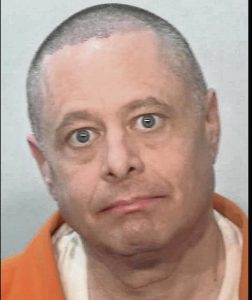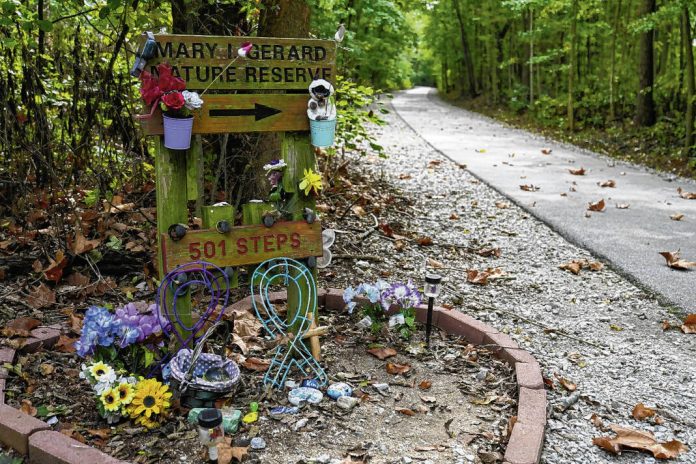By Áine Cain and Kevin Greenlee | The Murder Sheet
For the Daily Journal
DELPHI, Ind. — Prosecutors rested their case Thursday in the Delphi murders trial, after putting on a case mostly centered around confessions, statements and tips that came directly from defendant Richard Allen himself.
Carroll County Prosecutor Nicholas McLeland and his deputies Stacey Diener and James Luttrell handled a series of eyewitnesses and experts who linked the 52-year-old Allen’s Sig Sauer gun to an unspent round discovered at the murder scene, overheard the over 61 confessions he made while incarcerated, and who reported seeing a man wearing the same outfit that Allen claimed to have been wearing out on the Delphi trails on Feb. 13, 2017.
On that day, 14-year-old Liberty German and 13-year-old Abigail Williams vanished after crossing the Monon High Bridge. Searchers found their bodies the following day, near the banks of Deer Creek. One girl was naked. The other was wearing articles of her friend’s clothing. Their throats had been cut. German suffered at least four injuries to her neck. The pools of blood indicated that she staggered around the crime scene before dying. Crime scene expert Major Patrick Cicero of the LaPorte County Sheriff’s Office that Williams was likely wounded where she died, in a supine position on the forest floor.
Investigators found German’s phone beneath the body of Williams. German had recorded the abduction, filming a man in a blue jacket and jeans following her friend along the bridge before ordering both girls, “Guys, down the hill.” In the video, German appears to make a comment about a gun.
Days after the murders, Allen called in a tip placing himself on the trails that day starting around 1:30 p.m. He also claimed to have been on the bridge itself, and to have seen a group of girls. Those same witnesses told police they saw “Bridge Guy,” the then-unidentified figure in German’s video. But Allen’s tip was misfiled, and went undiscovered until volunteer Kathy Shank found it once more in 2022. Former forensic firearm examiner Melissa Oberg said she conducted testing that revealed that the cartridge at the crime scene had been ejected from Allen’s gun.

Allen was incarcerated in the Westville and later Wabash Valley correctional facilities due to a safekeeping order, although he was later transported to Cass County jail. While in Westville, Allen made a detailed confession to his psychologist, Dr. Monica Wala. He said that after visiting his mother and stepfather near Peru, he “bundled up” and headed to the trails after consuming at least three beers from a six-pack. He claimed to have laid in wait before ambushing Williams and German, forcing them down a hill. He said he believed the girls were older and planned to rape them. When a van appeared on an access road beneath the bridge, he said he panicked, forced the girls across Deer Creek and killed them. Experts testified that the Apple data on German’s phone showed no movement after 2:32 p.m.
On Thursday, the jury and gallery heard a number of recorded confessions that Allen made to his wife Kathy and his mother Janis in 2023 while incarcerated in the Westville Correctional Facility.
“I just want to apologize to you,” Allen said on April 3, 2023, in a recorded phone call to his wife. “I did it. I killed Abby and Libby.”
In a flat voice over a series of different phone calls, Allen repeatedly confessed and asked his wife and mother if they would still love him if he was guilty of murdering the two teenage girls. Janis and Kathy Allen replied on numerous occasions asking the defendant to stop talking and telling him that they believed prison officials were poisoning him in order to elicit the incriminating statements.
“I’ve just got to know that everybody’s still going to love me,” he told his wife on May 10, 2023.
Indiana State Police Master Trooper Brian Harshman — the detective responsible for monitoring Allen’s communications — testified that after listening to over 700 of the defendant’s calls, he believes that he recognizes the voice recorded on German’s phone.
“It’s the voice of Richard Allen,” he said.
During cross-examination with lead defense attorney Bradley Rozzi, Harshman also said that he believes that Allen’s bizarre behavior — which has included smearing and eating his own feces — is due to attention-seeking rather than mental illness or poor conditions in prison.
“I think Richard Allen struggles to be alone,” Harshman said.
He said that at one point Allen claimed to be “banging his head on the wall because no one would talk to him.”
In response to Rozzi’s question about whether or not his client posed a threat to others, Harshman noted that he had recently viewed a video of Allen in Cass County Jail, threatening to kill staffers and behaving in a violent and threatening fashion. After multiple sidebars between attorneys and breaks out of view of the jury, Special Judge Frances Gull ruled that the video would be inadmissible for now.
After the state rested, the defense kicked off their case with two witnesses. The first, Cheyenne Mill, was an eyewitness who arrived at the Monon High Bridge after 3 p.m. The state’s theory is that the girls were already dead by then. The defense has alluded to a theory indicating that German’s phone stopped recording movement because the killers drove the girls away in a vehicle.
A second eyewitness, Theresa Liebert, testified that she lives close to the trails. She said she saw a man near a mailbox in her neighborhood around 8:30 a.m. on the day of the murders. Liebert did not recognize the man, but was unable to provide any further description of the man, she said.
After the jury departed, Franklin lawyer Andrew Baldwin — who runs the Criminal Defense Team — concluded the day of trial by asking Gull if the defense could expect a ruling on their motion requesting the reintroduction of a third-party theory into the case. Baldwin and his team put forward a pre-trial theory involving ritual sacrifice that garnered considerable media attention. That theory was thrown out over the summer due to lack of evidence. Gull indicated that she was still considering the motion.
The Murder Sheet is a podcast that takes a journalistic and analytical approach to true crime coverage. They are partnering with the Daily Journal to provide coverage of the Delphi double-murder trial. Check out their podcast at murdersheetpodcast.com.





